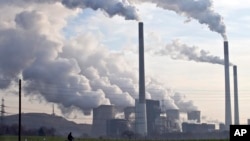The Obama administration’s proposal to fight climate change by cutting carbon pollution is opening yet another round of political debate in the United States. And the fallout will be seen in contentious legal challenges from states in the coming months.
Climate change has long been a politicized issue in the U.S. to a degree not found in other countries, experts say, even though its impacts span the globe.
An Ipso Mori Global Trends poll found that Americans are generally much more skeptical about climate change and what should be done about it than people in other developed countries. That debate spawned a movement of so-called climate change skeptics.
Political right
Those who initially cast doubt on climate change largely came from the political right who “saw climate change as a threat to free market economics,” said Naomi Oreskes, a professor of the history of science at Harvard University.
Taking action, they said, “would lead to the expansion of big government, more regulation of markets and a movement toward socialism,” according to Oreskes, the co-author of book Merchants of Doubt, which explores the history of climate change denial.
And that debate has garnered much media attention through the years, she said.
“The press then invites [skeptics] on TV, and the public sees a debate, the public sees a debate and thinks we don’t really know [about climate change],” Oreskes said. “Contrarians get a lot of limelight just by being contrarian. Media attention keeps them going.”
But Patrick Michaels, the director of the Center for the Study of Science at the Cato Institute, who has been called a skeptic, thinks another dynamic is at work in the U.S. that is not found in a lot of other countries.
“Unlike in much of Europe, there’s a substantial mistrust of authority,” he said, adding that the founding fathers were wary of a powerful central government.
States challenging Obama plan
That sentiment remains strong today. At least 15 states plans to challenge the Obama plan in courts this fall, saying, among other claims, that the federal government has overreached its authority.
Aaron McCright, a sociologist at Michigan State University who has studied the public understanding of climate science and policy, sees conservatives in the Republican Party as drivers of climate change skepticism. But that hasn’t always been the case.
For example, the conservative Nixon administration created the Environmental Protection Agency and passed clean air and water legislation, initiatives many conservatives today would likely oppose.
The struggling economy of the mid and late 1970s changed all of that.
When Ronald Reagan became president in 1981, one of the main thrusts of his administration was to “get government off our backs,” McCright said.
“The conservatives in the late 1980s and early 90s really ramped up their anti-environmentalism,” he said.
McCright said during this time, conservatives felt they had “few allies in academia and journalism” and needed to create their own intellectual space to promote conservative ideas, largely in the form of think tanks.
Oreskes said deniers and skeptics also began to personally attack the scientists who’d done some of the key research on climate change.
“By the late 90s and early 2000s, the attacks get worse,” she said. “The scientific community was blindsided. They thought they could get the problem solved with science.”
Skeptic movement
Sociologist McCright said the skeptic movement mimicked the way the tobacco industry fought efforts to cast cigarette smoking as unhealthy by raising doubt on the science that said smoking was dangerous.
Richard Muller, scientific director of Berkeley Earth and a skeptic who says that the link between global warming and climate change has not been scientifically proven, wonders why Europeans are not more on board.
“The real question in my mind, is why there has not been more skepticism in Europe,” he said. “The solutions being proposed in the U.S. will not do the job.”
“The vast bulk of that warming is going to come from China, India and the developing world,” he said. “Any solution that ignores the developing world is not a solution.”











